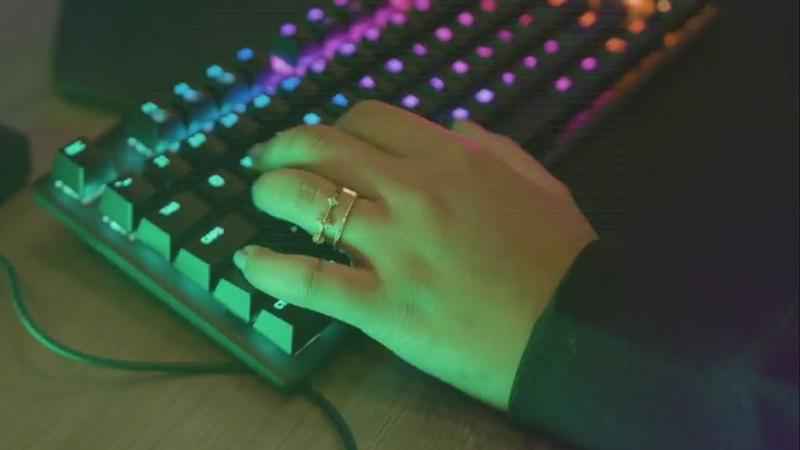New all-women professional gaming team inspires others from its Eagan headquarters
[anvplayer video=”5068574″ station=”998122″]
A group of game-changing women is helping esports grow right here in Minnesota. Eagan-based Version 1 announced its first all-female team in September.
Version 1 is a multiplatform professional gaming organization owned by Wilf family, which owns the Vikings, and investor Gary Vaynerchuk. It supports four professional esports teams.
Its new five-person team is called Version X, bringing together women gamers from across the country.
"I’ve always just been a casual gamer and now all of a sudden I’m going pro so I was like wow this is actually happening," said Katherine "Karra" Lee, a 16-year-old from Chicago. "It means a lot because there’s not a lot of signed teams yet."
She moved to Eagan last month to train alongside her fellow team members.

[KSTP-TV]
Twenty-five-year-old Kiara "Milkyway" Blue Kukilakilaokalani Makua, who has competed professionally since 2016, relocated from Hawaii. Natalia "Natty" Jackson, 27, joined the team after graduating from the University of Maryland earlier this year. Rachel Lynn "Rush" Hang is a 25-year-old from Detroit. Naomi Sauvola, 23, joined Version X after competing with another team for several months, CLG Red.
Version 1 provides the team housing, a practice room, and other amenities at the Vikings Innovation Center. They train together for six to seven hours each day.
"Playing with five girls is really nice because we all really get along with each other, which is important," said Makua, who is the team’s in-game leader. "We all kind of mesh well together so I feel like the chemistry is there."
These women compete in the game VALORANT.
"We worked so hard for this," said Makua, who described crying when she learned she’d be signing with Version 1. "We’re kind of paving the way for all of the other female teams that might be picked up in the future."
They join a growing number of women’s esports teams. In early 2021, VALORANT’s developer Riot Games launched an all-female league called VCT Game Changers. Thirty-two teams competed at a Game Changers tournament this fall.
"We always had plans to play in the women and gaming space the question is just how," said Jake Trobaugh, the Version 1 director of esports strategy.
He said the league is the reason their organization formed a team. Trobaugh described women in gaming as "an underserved community."
"Riot, the game developer who made VALORANT did a very good job of recognizing that, I would say," Trobaugh said. "The opportunities they’ve given to these women, it’s so drastic that you see girls shifting from other games because they want to play VALORANT."
In a video announcing the league, VALORANT Executive Producer Anna Donlon said, "If we want to build a thriving competitive scene for VALORANT, which we do, we have to cultivate communities where players can compete together safely."
Within the announcement, Riot Games linked to other plans to address issues, including harassment within the game. It’s a problem female gamers have reported dealing with across the industry as a whole.
"It’s important to know that these girls have really fought through a ridiculous amount of adversity," Trobaugh said. "I want to pretend that’s unique to our team but I think that goes for any girl right now playing at the professional level. It’s really difficult to deal with all of the setbacks that come from trying to be a female professional gamer, whether that’s going into a public match and experiencing an egregious amounts of toxicity or fighting a social norm that says it’s irregular for you to be spending x amount of time practicing and honing your craft."
The Game Changers league is helping encourage more women to play, according to Makua.
"I would like to share that if other female teams have good work ethics and put a lot of hard work into it, they could have this opportunity as well," Makua said. "Just keep it up and work hard even though it seems really difficult some times and complicated to keep going and to keep trying […] If playing video games is one of their passion then I’d want them to keep striving to do that so they can have a successful future in esports."
While they acknowledge they are role models to others joining the sport, these team members are also inspiring each other.
"Milky has a lot of experience," Lee said. "Watching her play I take a lot of notes from her because she’s smart, she’s like a defined player and I’m just a new player just picking up stuff and it’s really fun watching her."
Makua responded, "Karra, you’re selling yourself too short. Karra is an amazing player […] She’s going to be one of the greatest female players ever."
Trobaugh acknowledges pay for women gamers is still lagging behind men.
"Salaries are growing in women esports at the same rate they grew in men’s esports years and years ago when those titles were first starting," he said. "I think you’re seeing similar salary growth trajectories in terms of year over year percentage increase. I think will take a few years for that compounded increase to catch up and I think that’s a function of how long these leagues have been alive."
A recent Game Changers tournament featured a $50,000 pool, which is the same as the prize pool offered for its other events.
Analysis of gender pay disparities in gaming vary but an essay published in the Marquette Sports Law Review reports lifetime average earnings of the top 100 male participants was 84 times higher than female participants.
Data collected by Currys PC World and Intel shows, in 2020, the top esports female player made $358,000 in total winnings compared to the top male player who made $6.9 million. Other sites show similar disparities.
"It’s case-by-case, it’s league-by-league," Trobaugh said. "There are women gamers and women professional players that make more than some men do."